Letter from Africa: The Afro-punk band taking on 'whitewashed' history
- Published
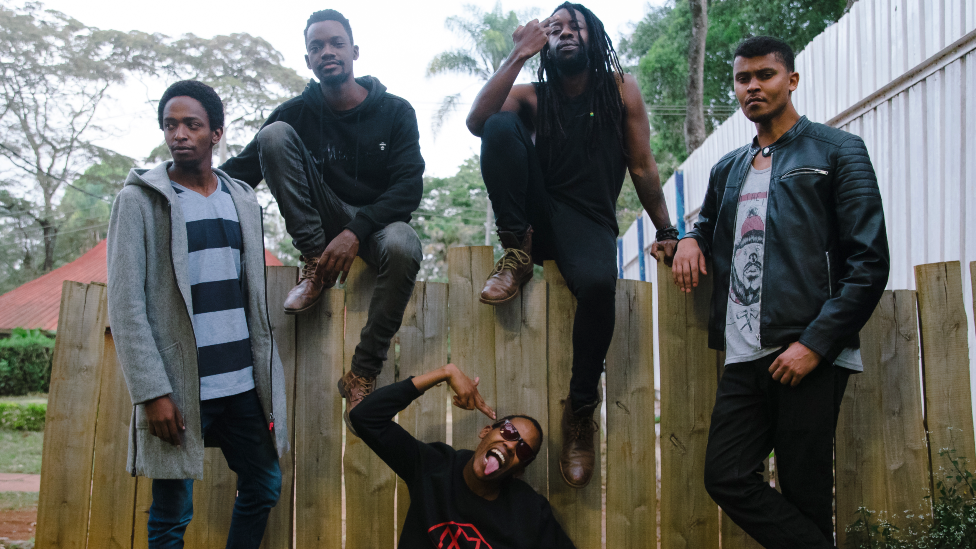
In our series of letters from African journalists, Ismail Einashe meets some Kenyan musicians with a cult following who are challenging the status quo.

Crystal Axis, a five-piece Afro-punk band, has established itself as one of the leading group on Kenya's burgeoning rock music scene.
I find them rehearsing in a recording studio at the International Trade Fair Grounds, on the outskirts of the Kenyan capital, Nairobi.
One of the guitarists plays distorted riffs on his instrument with a scratchy, heavy sound as the drummer energetically beats his drums.
The group is made up of Ahmed Bulhan, known as AB, on vocals, Djae Aroni and Fox Elijah on guitar, Doug Kihoro on bass and Dan Gichia on drums and percussion.
Their origin lies in Nairobi's late noughties alternative music scene, which had a number of bands performing everything from indie rock and punk to heavy metal.
At the time Aroni was at school when one night he snuck out of home to see a post-hardcore band, Jack the Hammer. The lead singer and guitarist happened to be Elijah.
Seeing Elijah rocking it out on stage in his black skinny jeans, classic Vans and fierce punk attitude had an impact - and the next day Aroni went to school and told his friends he wanted to start his own rock band.
We literally had to bribe our way into our own gigs"

Shortly afterwards in 2009 he set up Crystal Axis and was soon joined by AB, with Elijah and Kihoro joining in 2017 and Gichia last year.
Growing up as teenage rockers and performing while still in secondary school posed its problems, says Aroni.
They had to dodge bouncers at clubs who demanded to see their IDs: "We literally had to bribe our way into our own gigs."
Unlike most young Kenyans who are into Afrobeats or hip-hop, the raw energy of punk rock was their inspiration.
For Aroni it came from watching US group Green Day's live film Bullet in a Bible and seeing lead singer Billie Joe Armstrong holding his crotch while gyrating wildly on stage. He thought to himself then: "This is what I want to do."
His bandmate Kihoro was inspired by listening to Scandinavian death metal, while drummer Gichia honed his musical skills in his teens playing in a local Christian rock band.
In 2017 the band released their first major EP, Leopold - a commentary on the mass colonial atrocities committed by King Leopold II of Belgium in what is now the Democratic Republic of Congo.
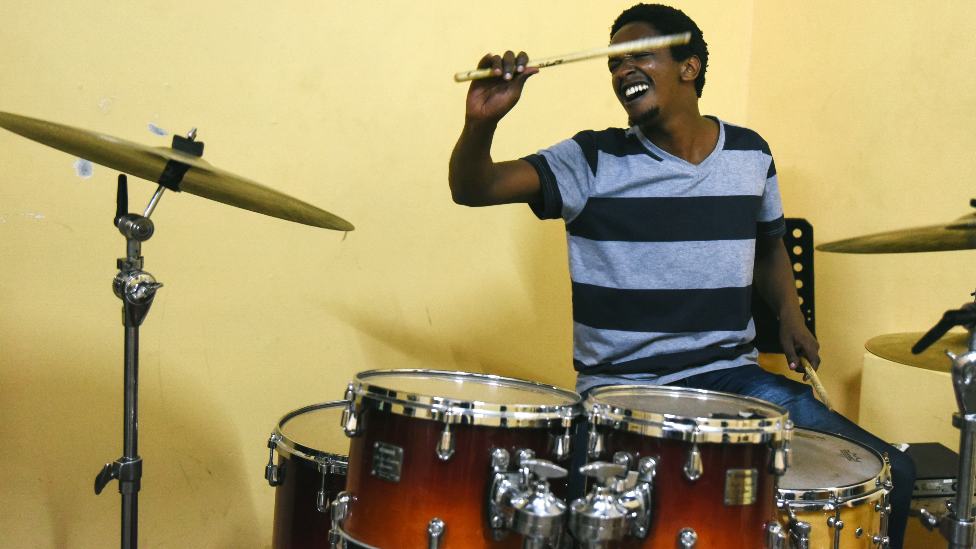
Crystal Axis eschews Afrobeats - more popular in Kenya - for the raw energy of punk
Since then they have released three more EPs that have garnered them a devoted following in Kenya and internationally - people drawn to their bold, infectious and distinctly punk rock sound.
Their lyrics, in English and a smattering of Swahili, are highly political and delve into everything from colonial history and corruption to racism.
"[We want to] tell African stories from an African perspective," Aroni says.
Their hit single Nyayo House, external addresses the legacy of Daniel arap Moi, Kenya's longest-serving president, who led what became known as the "Nyayo regime".
The raging lyrics shine a light on a harrowing aspect of Kenyan oppression and are an indictment of an era when there was no freedom of expression in the East African nation.
Nyayo House is a high-rise government building in central Nairobi infamous for its torture chambers used for opponents of Moi, who was in power from 1978 to 2002.
"We are dissidents… Nyayo is sickening," scream the lyrics of the song, which AB says is about "generational trauma" and the need for Kenyans to speak about this history.
In August Crystal Axis released their latest EP, Black AF, external, a celebration of contemporary African identities.
It draws on their own experiences as young black Africans who contend with various challenges such as corruption, but is also a celebration of their strength, talent and creativity.
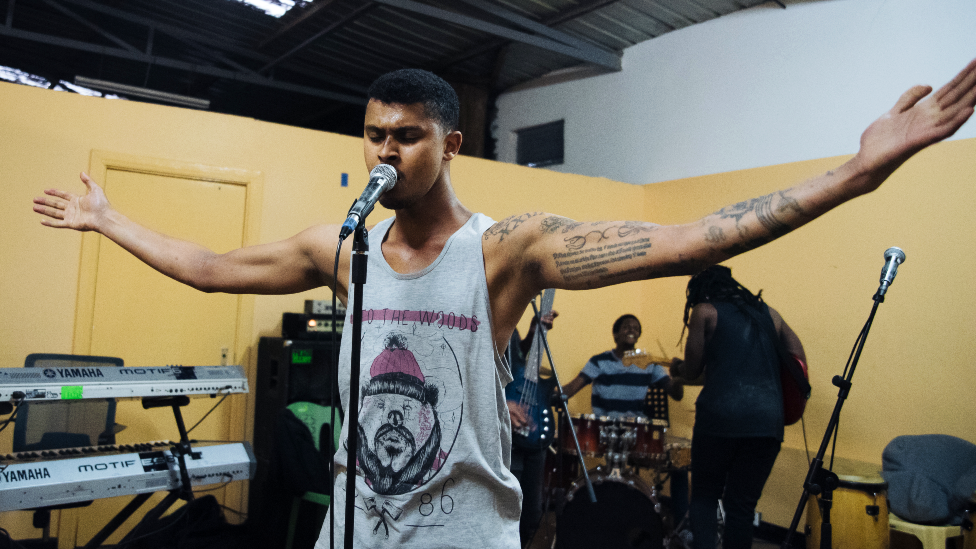
The lyrics AB belts out are highly political
The band also wants to use the power of punk rock music to create a space for young Kenyans to make this music on their own terms.
Another aspiration is to reclaim punk rock history, which they say has been "whitewashed" and the contribution of black punk artists often forgotten.
Aroni gives the example of black pioneers like Death, a proto punk band founded in Detroit in 1971, which tends not to be credited for its development of the early punk sound.
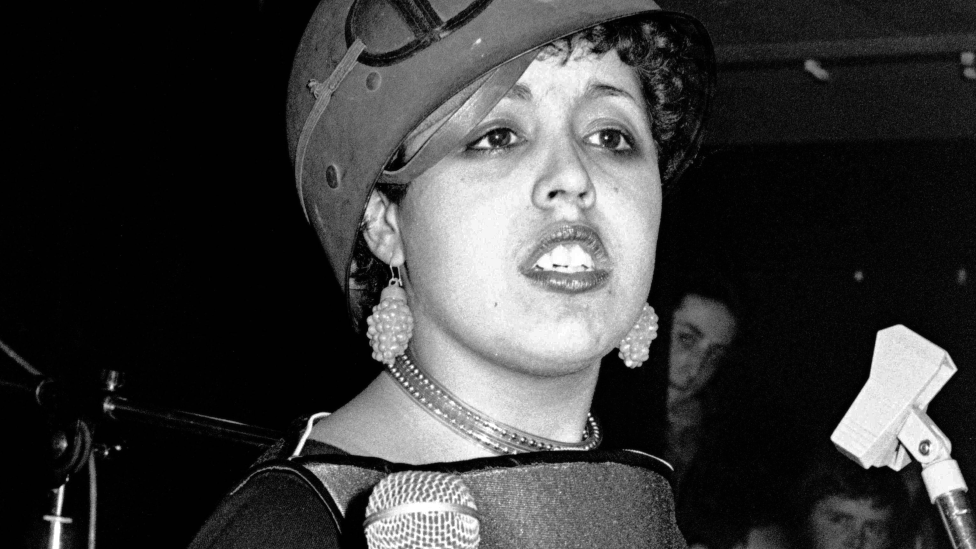
Black punk pioneers like Poly Styrene are often overlooked
In the late 1970s punk heyday other black bands also played an important role in the explosive growth of the genre with groups such as Pure Hell, formed in Philadelphia in 1974, and X-Ray Spex, formed in London in 1976 by the Somali-British punk pioneer Poly Styrene.
As part of their efforts to challenge the image of punk rock music as a genre dominated by white, male bands, Crystal Axis was meant to play at the Decolonise Fest in the UK last month.
The festival celebrates punk music by people of colour, but the band members were denied visas to enter the UK - much to their outrage and disappointment as they had sold out shows in Leeds, Manchester and London.
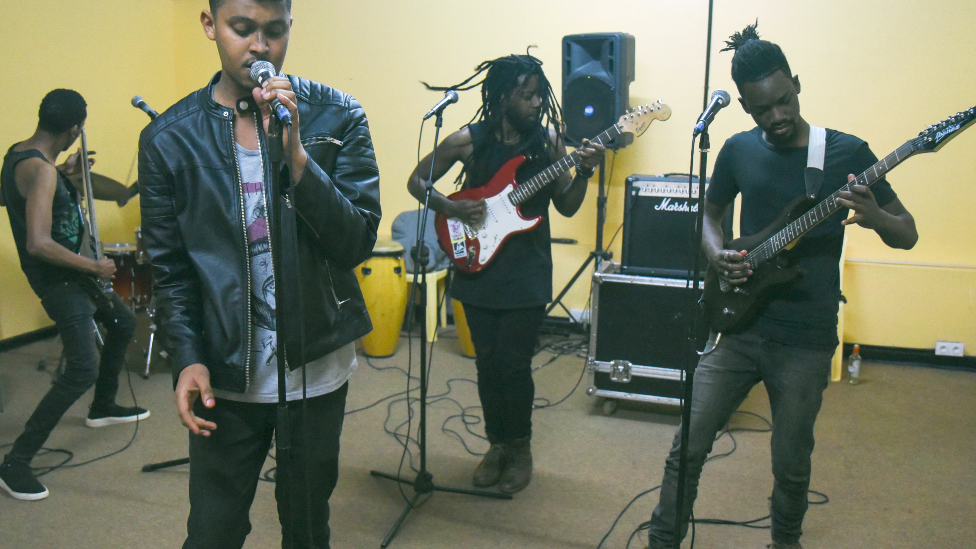
The band members are furious that their UK visas were turned down for last month's Decolonise Fest
But this has not dented their ambition - and they see punk rock as a powerful means to channel their rage, intellectual curiosity, joy and hopes.
In the recent Kenyan elections the majority of the band members did not vote, with Kihoro saying Kenyan politics is "full of old men".
Aroni agrees, adding that most young Kenyans feel powerless to alter the political landscape: "We are disenfranchised. There's nothing we can do."
Yet Crystal Axis' lyrics are a warning that young people should not be ignored.
Their 2020 song Take The Throne about "over policing" in Kenya and the violence of the state explodes with words: "Send your soldiers, send your mob. We're 50 million, and we're tenfold strong.
"Rip it down! We'll build again from scratch. Every roaring fire starts with just a single match."

More Letters from Africa:

Follow us on Twitter @BBCAfrica, external, on Facebook at BBC Africa, external or on Instagram at bbcafrica, external

